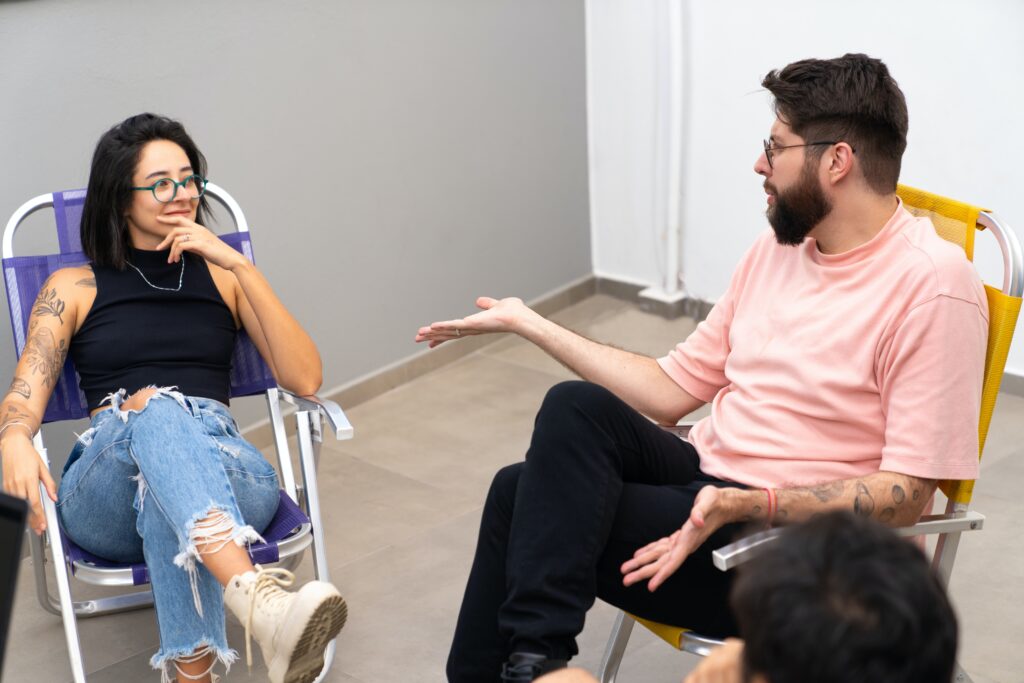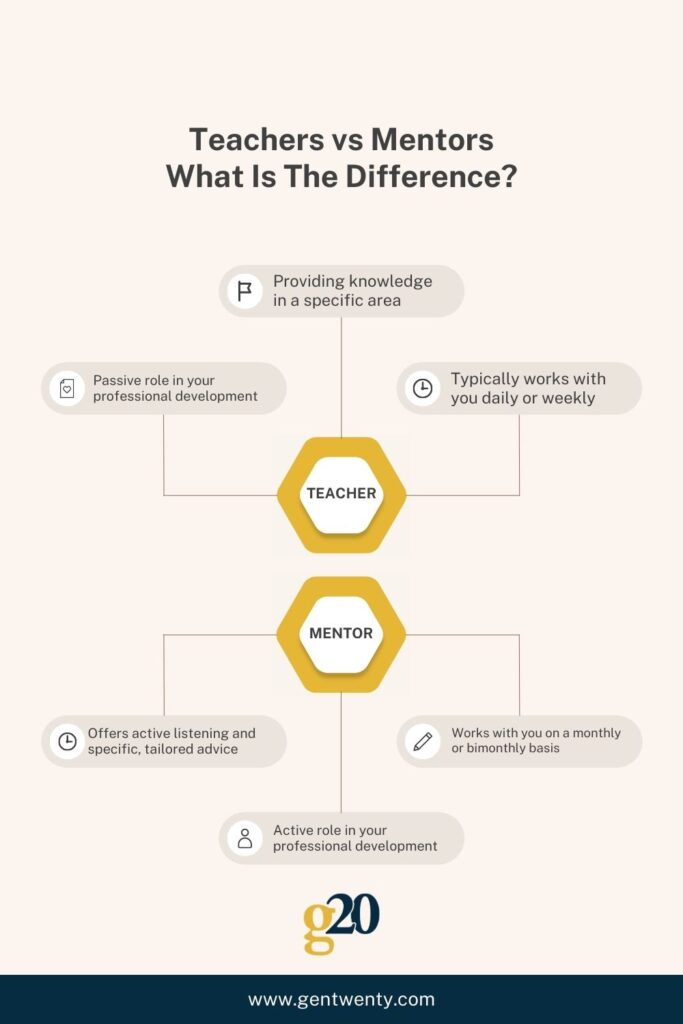Growing up as the daughter of an academic, I saw my parent teach hundreds, perhaps thousands of students over the years. They also mentored many students simultaneously, both at the graduate and undergraduate levels.
Having been a teacher myself (albeit for a different subject that required completely different qualifications), I have a newfound respect for how that parent was able to deftly balance both mentoring and teaching.
While I am aware that there can be plenty of crossover between a mentor-mentee and teacher-student relationship and many nuances, my experience teaching English in East Asia taught me that the biggest difference between a teacher and a mentor boiled down to one thing.
Do you feel like your education journey has been a lonely one? Have you ever wished for someone to help guide you on the path to success? That’s where mentoring and teaching come in!
It can be easy to confuse these two terms, but understanding the differences between them is critical if you want to make sure that your educational needs are being met.
In this blog post, we will discuss what distinguishes mentors and teachers, how they may interact with their students, and when it might be beneficial for students to seek out either a mentor or teacher to help you in your career journey.

Defining the Roles of a Teacher and Mentor
As a student, it’s important to understand the difference between a teacher and a mentor.
Teachers are responsible for lesson planning and helping students learn specific subjects, while mentors provide guidance and support to help students achieve personal and professional goals.
The key difference is that while a teacher’s role may be limited to the classroom, a mentor’s role extends beyond the classroom and into the realm of life advice. The primary role of a teacher is to ensure students learn and develop specific skills.
Being a mentor means offering insights from personal experiences, industry knowledge, and professional networks to help pave the way for a student’s future success.
A mentor goes beyond their career role to offer practical advice for career and professional development.
A mentor has their own career role which may or may not be teaching. They are likely specialist in a subject area, and may be far enough in their career to have their own practice. Whereas with teachers, their primary responsibility is teaching.
Whether you’re seeking academic guidance or advice on your long-term career goals, a teacher and mentor can both offer invaluable support and knowledge.
It’s up to you to take advantage of these resources and use them to your advantage.
As a Teacher, I Taught to Ensure That My Students Acquired Knowledge
My entire language education came from the United States where I was not the expert and was expected to learn language concepts from textbooks, whereas in East Asia, the role was reversed: I was teaching students my native tongue and considered the expert.
Having had experience of being a language learner myself was an asset because it allowed me to sympathize with the difficulties my students were experiencing.
Contrary to what many people believe when they hear me speak Japanese now, I didn’t speak the language conversationally until I was 15.
My parents sent me to Japan for the majority of the summer that year; it was there that I realized a Japanese-passing American speaking Spanish might as well have been…well, you get the idea.
After that trip, I resolved to learn Japanese, knowing that I would have to learn to communicate rather than rely solely on my one English-speaking Japanese relative outside my immediate family.
I had always known that Japanese doesn’t have the letter L in their alphabet, which means that many have trouble pronouncing that consonant correctly, but that was the summer I learned that English and Spanish sentence structures were the polar opposite to that of Japanese sentence structure.
The point is that having learned Japanese essentially from scratch, I could easily put myself into the shoes of my students. This helped me build rapport with students, which, coupled with my knowledge of Japanese culture, allowed me to teach my clients in Tokyo more effectively.
I was relaying English language concepts while using real-life examples that allowed them to practice using the language in scenarios that were familiar to them.
Every teacher teaches differently, and it must be acknowledged that some of those differences arise due to the differences in subject material and intended audience. My parent and I were both teachers; we teach very differently because we both taught different subjects to different people.
Mentors Impart Knowledge Based on Their Personal Experience
An article I read online recently stated that “getting a mentor ultimately depends on a fit between your aspiration and the mentor’s lived experience and wisdom.” This is very true in my experience.
The mentor-mentee relationship is a very special one. The role of a mentor is more of an active role in your life.
I recently contacted my mentor and shared my experiences with her to give her context before asking her for advice on how best to navigate the situation I was having trouble with at work.
She was kind enough to not only give me advice on the particular situation, but also give me advice on what she thought I needed to do to grow within the role and develop additional skill sets.
All of the examples she gave me to illustrate the importance of what she was telling me were pulled from her own career experience in a completely different field than mine.
She wasn’t teaching me concepts about a certain topic in any way; rather she was sharing what worked for her with me and giving me actionable steps I could take.
She didn’t expect that I would take all of those suggestions-she left me to determine what would work best for me and how to apply what she had suggested I do to my own situation, something that is very different to how a teacher imparts information.
Mentors can act as a sounding board, practicing more active listening and providing feedback to key points to your professional development pulling from their own experience.

Examining the Different Responsibilities of Teachers and Mentors
From my practical experiences above, you can see the roles of teachers vs mentors is very different.
As educators, both teachers and mentors play a crucial role in shaping the minds and futures of their students.
While the responsibilities of both positions are often similar, there are some key differences between the two.
Teachers are responsible for developing lesson plans covering basic concepts, grading assignments and tests, classroom management, and ensuring that their students are meeting academic standards.
Mentors, on the other hand, often work with students on a more personal level, providing guidance and support outside of the classroom.
While both roles require extensive knowledge and expertise, it’s their different areas of focus that set them apart.
Teachers can be mentors through official mentor programs, of course. New teachers, novice teachers, and first-year teachers often need a few years of experience under their belts to participate in mentorship programs.
Teachers can draw on their years of experience to provide information on a specific subject.
Both can help you reach a specific goal and can serve as a role model. A mentor does not teach but provides more specific advice for specific situations and career development.
Whether you’re a school teacher or a mentor, the goal of both is ultimately the same: to help students succeed both in and out of the classroom.
Exploring the Benefits of Having Both Types of Professionals in Your Life
Now, the question is, do you need both? And the answer is quite frankly, yes.
These two professionals play significantly different roles in your life. Teachers are almost necessary – we all are required to go to school.
Mentors, on the other hand, are not something every person has the privilege of seeking out. Many mentoring relationships aren’t as formal as they could be.
Having a wide range of professionals in your life can be incredibly beneficial. Being able to reach out to both types in your life is important.
Consider it this way – who makes up your professional toolbox?
Whether it be a lawyer, accountant, or even a therapist, there are benefits to having all kinds of generalists and specialists in your corner.
Think of it like this – a generalist (like a teacher) can provide a broad perspective on various issues, while a specialist (a mentor) can give more specific and detailed advice within their area of expertise.
Combining the two can give you a more well-rounded approach to problem-solving and decision-making. It’s like having a toolbox with multiple tools, each serving a different purpose.
Why limit yourself to one when you can have the best of both worlds? Consider diversifying your network of professionals to reap the full benefits they have to offer.

Uncovering the Different Strategies To Utilize to Help You Succeed
Have you ever wondered what strategies professionals use to help their clients succeed? Each profession has its own set of tactics, tools, and resources to empower their clients to reach their goals.
Both mentors and teachers can help you better understand the how to use these tactics in your career.
For example, career coaches may use personality tests to match their clients with the right job, while financial advisors may create personalized investment plans based on their clients’ risk tolerance and financial objectives.
In the healthcare field, therapists may take a cognitive-behavioral approach to treat mental health issues, while nutritionists may suggest meal plans based on their clients’ dietary needs. Ultimately, finding the right professional and their unique strategies can help you not only achieve success, but also navigate life’s challenges with confidence.
Discussing How to Leverage Your Mentor or Teacher’s Skills to Reach Your Goals
When it comes to reaching your goals, having a mentor or teacher to lean on can make all the difference.
These individuals have a wealth of knowledge and experience that can be leveraged to help you better understand your industry or subject matter.
Whether you’re seeking guidance on career paths, looking for new ways to approach a project, or just in need of some motivation, your mentor or teacher’s skills can be a valuable resource.
But how can you make sure you’re making the most of this relationship?
Start by identifying your areas of need, and then open up with your mentor or teacher to best utilize their skills. Remember, this is a two-way conversation, so always be willing to listen and learn!
Teachers can make great mentors and can be both a teacher and a potential mentor!
Looking at Ways of Finding Good Mentors and Teachers in Your Area
In today’s world, finding a good mentor or teacher can be a game-changer for your personal and professional growth. But with so many options out there, it can be overwhelming to know where to start.
One of the best ways to begin your search is by tapping into your network.
Ask friends, colleagues, and even family members if they know of anyone who could offer valuable guidance and support.
Another approach could be to attend industry events and conferences, where you can connect with experts and leaders in your field.
And don’t forget about online resources! There are countless online communities and forums where you can seek out advice and mentorship from experts and peers alike.
The point is, don’t be afraid to put yourself out there and ask for help. You never know who might be willing and able to provide the guidance you need to achieve your goals.

Final Thoughts on Teachers Vs Mentors
What have we learned in this look at teachers vs mentors?
We’ve taken a deep dive into exploring the various roles, responsibilities and benefits of both professionals, as well as how they can support our goals.
Teachers come in all shapes and sizes, but provide structure and guidance as educators. Mentors bring a more personalized approach to our development; offering wisdom, advice and inspiration from their own experiences.
When it comes down to it, having multiple mentors or teachers in your corner is an ultimate life hack for fostering growth and progress.
Finding someone who can both teach you new ideas and mentor you through the application process will be key in attaining success.
Both teachers and mentors can add value to your life in different ways. I personally found it very fulfilling to be a teacher, but at the same time, different factors prompted me to move away from the field.
Being mentored has been wonderful for me because I feel as though I have support from someone who is completely separate from my job and can therefore offer me a completely unbiased, objective perspective on the challenges I face in my professional life that give me actionable steps that allow me to improve.
While everyone’s expectations with both mentors and teachers are different, both can add immense value to one’s life.
